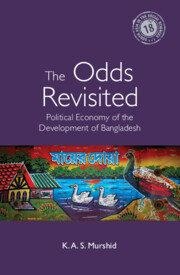Book contents
- Frontmatter
- Dedication
- Contents
- List of Tables and Figures
- Acknowledgements
- List of Abbreviations
- Introduction
- 1 A Bird’s-Eye View of the Bangladesh Economy: 1971–2020
- 2 Initial Conditions: The Odds Revisited
- 3 The Food Security Challenge
- 4 Exploring Transition and Change in the Rice Market
- 5 International Migration
- 6 The Rural Non-farm (RNF) Sector
- 7 Industrialization and the Rise of RMG
- 8 Industrialization: Other Stories
- 9 The Social Sector Puzzle
- 10 Dhaka: Capital Formation—Urbanization, Competition and the Rise of a Business Class
- Conclusion
- Notes
- Glossary
- References
- Index
9 - The Social Sector Puzzle
Published online by Cambridge University Press: 30 June 2022
- Frontmatter
- Dedication
- Contents
- List of Tables and Figures
- Acknowledgements
- List of Abbreviations
- Introduction
- 1 A Bird’s-Eye View of the Bangladesh Economy: 1971–2020
- 2 Initial Conditions: The Odds Revisited
- 3 The Food Security Challenge
- 4 Exploring Transition and Change in the Rice Market
- 5 International Migration
- 6 The Rural Non-farm (RNF) Sector
- 7 Industrialization and the Rise of RMG
- 8 Industrialization: Other Stories
- 9 The Social Sector Puzzle
- 10 Dhaka: Capital Formation—Urbanization, Competition and the Rise of a Business Class
- Conclusion
- Notes
- Glossary
- References
- Index
Summary
Let me only add … that while recognizing the deep difficulties currently besetting the system – including the recent severe floods – I do not share the general sense of despondency, if not despair, concerning the prospects for the future. There are enough things, I am firmly convinced, within the control of the decision-makers of Bangladesh to convert present stagnation into satisfactory – though by no means spectacular – forward motion.
– Gustav Ranis, ‘Brief Reflections on the Central Issues of Policy in Bangladesh’The role of human resources in a country's development journey is crucial in supporting high-value agriculture, industry and services. We saw earlier that Bangladesh had chalked up considerable gains in social outcomes, especially in certain key indicators related to family planning, health, primary education, nutrition and women's empowerment. In fact, the most commented upon achievements of Bangladesh relates to its successes in the social sectors. Pointing to widely available governance indicators and corruption scores, especially emanating from the World Bank and Transparency International, observers have struggled to reconcile these positive social outcomes to the disappointing performance in governance. This struggle intensified further given the relatively small public resources that were deployed to social sector programmes over the years (Chowdhury and Osmani 2010; Asadullah, Savoia and Mahmud 2014). The question to ponder over, therefore, is how these much-vaunted social outcomes were achieved, given acute resource constraints, poor political and economic governance and an uncertain aid regime within an unstable and depressed socio-economic environment.
The explanations attempted have generally referred to non-governmental actors, aid-supported interventions, low-cost solutions, attitudinal and behavioural changes, role of community organizations and a generally supportive role of the government.
Thus, Chowdhury et al. (2013) attribute the health sector performance to pluralistic health systems, women-focused interventions, family planning, oral rehydration therapy and immunization programmes, effectively delivered by trained community healthcare workers.
Asadullah, Savoia and Mahmud (2014) found no evidence to suggest that the performance was income mediated or support led, as some had indicated and suggested that an inclusive approach combined with government and NGO efforts ‘in all social sectors’ were responsible: successful awareness campaigns were launched, low-cost innovations helped reduce fertility and child mortality rates, and gender parity in education was achieved through, for example, the ‘Female Secondary School Stipend’ programme.
- Type
- Chapter
- Information
- The Odds RevisitedPolitical Economy of the Development of Bangladesh, pp. 143 - 170Publisher: Cambridge University PressPrint publication year: 2022



